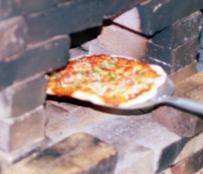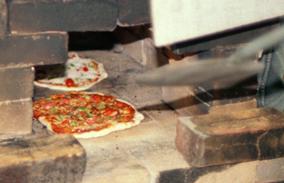
Saint Paul Bread Club
We knead to bake!
Page Menu
Other Links:
Portable Brick Oven Classes with David S. Cargo
Since 2017, I have been calling my class “Stack, Fire, Bake”, since that more precisely defines the format of the class. The result of the class is a portable brick oven.
Learn how to build a portable stacked-brick oven from award-winning baker, David S. Cargo, at several convenient locations.
For information on past classes, see here.
For more info on the features, advantages, and disadvantages of these portable brick ovens, see here.
For info on the requirements for hosting a portable brick oven class, see here.
Class schedules
Saturdays
Classes are usually on Saturdays from 9 a.m. until 5 p.m. I sometimes have to squeeze the class into 9 to 4, 9:30 to 4:30, or 10 to 5. Classes further away from the Twin Cities tend to have later starting times to simplify my travel arrangements. Other times, the hours of the facility hosting the class determines the starting and ending times.
Other days
There are a few alternatives to the “whole Saturday” format. If you are scheduling a private class, it could be during the week, and the times could be more flexible.
Evenings
Alternatively, the class can scheduled for two evenings, say for example, Wednesday and Thursday, from 6:00 to 8:30 pm.
This schedule may be desirable if no Saturdays are available or where evening community education is a typical format.
Simple, but strong

This is an image from the Sept. 11, 2010 class at Silverwood Park. I stand on the finished oven to show how strong it is. (Ovens built from new bricks look much more regular and are prettier.)
I have taught this class over 70 times. I’ve had hundreds of students.
I believe it to be the most popular oven-building class in the United States, based on the number of classes, the number of locations, and the number of students who have attended. In 2016 the class was held in four states. In 2017 the class was held in five states.
If you do a search on Google for “minnesota oven class” or “wisconsin oven class”, a link to this page is often the first link that wasn’t paid for. If you just search on Google for “oven building class”, a link to this page is often the first link that wasn’t paid for.
This class was also mentioned in From the Wood-Fired Oven by Richard Miscovich, published by Chelsea Green.
My class is again a scheduled workshop at the Kneading Conference in Skowhegen, Maine on 2018. It’s part of the conference program, so you had to be registered for the conference first before you could sign up for my workshop. (My workshop at the conference in 2016 was filled, with one man driving all the way from Ohio just to attend my class.)
Other future classes
Wherever I can find interest in my classes, I will try to find a folk school or other community education organization to act as host for my class. Sometimes these negotiations result in a class being scheduled.
2018 Classes (Preliminary)
Oven-Building Classes
Stack, Fire, Bake
| Date(s) | Host | State | Info |
| 05/05/18 | Borner Farm Project (Prescott) | WI | reg. info |
| 06/02/18 | White Bear Center for the Arts (WBL) | MN | reg. info |
| 06/09/18 | Tunnel Mill | MN | reg. info |
| 06/16/18 | Running Dog Ranch (Stockholm) | WI | reg. info |
| 06/23/17 | Gale Woods (Minnetrista) | MN | reg. info |
| 07/21/18 | St. Joseph Parish (Farmington) | ME | Scheduled |
| 07/28/18 | Kneading Conference | ME | Scheduled |
| 08/11/18 | Avon Hills Folk School (Avon) | MN | Scheduled |
| 08/18/18 | Our Saviour’s Lutheran Church (Minneapolis) | MN | Reserved for a private class |
| 08/22&23/18 | Borner Farm Project (Prescott) | WI | reg. info |
| 09/15/18 | Solheim Market Garden (Eau Claire) | WI | canceled |
| 09/29/18 | White Bear Center for the Arts | MN | reg. info |
| 10/20/18 | Borner Farm Project (Prescott) | WI | reg. info |
If you were thinking of classes for 2018 but didn’t find a date, perhaps you should look at scheduling the pair of evening classes.
Related Classes
Burning Questions About Wood-Fired Ovens
In 2017, I had some discussions with Saint Paul Community Education about teaching classes for them. They didn’t have a location for a Stack, Fire, Bake class, nor a gauge about the potential level of interest.
However, they thought that a lecture and Q & A class might work. So, I put together a proposal for such a class, named by me as Burning Questions About Wood-Fired Ovens. Here’s the description:
Do you love brick oven pizza and bread? Building your own backyard oven is simpler than you think, and it doesn’t have to be a permanent fixture. Learn about the various styles of backyard brick ovens, how to buy or build your own, as well as the regulations to having one.
The spring class was held on April 24.
The summer class was held on July 10.
The fall class is scheduled on October 17.
I see preparing for this class to be an opportunity to create an introductory chapter to a future book about my oven designs.
Class Location Map
Here’s a map I created to show where the some current and past scheduled classes are located.
Class Description
Here is the brief description of the class:
Stack, Fire, Bake – Join David S. Cargo to learn how to build a portable stacked-brick oven. After the oven is built, it will be fired up while students learn how to make dough for flatbreads, pizza, and bread. Bake the naan, pita bread, and pizza in the hot brick oven and then eat them.
You will leave with knowledge of building stacked brick ovens, plans for three different sizes of ovens, and practice in baking in these ovens.
Class typically runs 9am-5pm with a 1-hour break starting a noon for students to have lunch. (Lunch is typically not provided in the class registration fee. Different venues might have facilities available for people to buy lunch or people might have to travel somewhere to buy lunch or bring it with them.)
The longer description of the class is more interesting
These brick ovens are portable because they can be moved once they have been built. They are built from stacked bricks that are not mortared together. If you need to move the oven, you can just move the bricks and restack them to rebuild the oven at its new location.
You can build a small oven by yourself in about an hour or two. You can go from bare ground to cooking pizza in about 4 hours. Class discussion covers some of the differences between these portable brick ovens and more familiar designs such as Alan Scott ovens, Forno Bravo Pompeii ovens, and cob ovens such as those made popular by Kiko Denzer.
The class covers siting the oven, preparing the ground for the oven, and then the practical techniques for construction. Every student gets a handout with plans for three different sizes of ovens, their bills of materials, and recipes for use with the oven.
In the class we build an oven. It’s built to demonstrate the techniques and how to read the plans that show how the ovens go Together. After it’s built, it’s fired for four hours to get it up to baking temperature (usually 800 degrees or more).
While the fire is heating the oven up, David demonstrates how to make the doughs for pizza and bread, for naan, and for pita bread.
Later in the afternoon, the doughs are formed into the proper shapes for baking, and some dough is formed for a loaf of bread. Finally, the pita bread, naan, and pizzas are baked (and eaten) and then the loaf of bread goes into the oven.


Photos courtesy of Jeff Schalles, 2012.
Students who have taken the class and completed evaluations have said how much they enjoyed the class. They learned to appreciate the advantages and disadvantages of stacked-brick ovens compared to more well-known Alan Scott, Pompeii, and cob oven designs. People who had been intimidated by the other construction techniques expressed amazement at how quick and easy it is to build a portable oven.
This class includes elements of other classes that I teach, including Bread Without Fear, Feast of Flatbreads, and No-Knead Breads. Their descriptions are here.
Class Format
The process of building the oven is hands-on for all of the students.
Because the oven is too small to bake all the dough that could be made by all the students in the class, the baking portion of the class is demonstration and tasting.
If the oven in the class is heated up adequately, pretty much all the dough for naan and pita bread will be baked, as well as four or more pizzas and a loaf of bread.
Class Fees
Class fees for the classes at each location are set by that location. (Each location handles its own registration.)
Class Evaluations
The students taking the oven-building class have been impressed by how quickly and simply an oven can be built.
A few students have volunteered that class tuition could be higher, since what was taught was so valuable.
Some locations may request that students fill out class evalution forms, either physically or electronically.
Class E-Mail List
An e-mail list for people interested in recipes, updates on class schedules, and questions and answers is available. Sign up by sending e-mail to escargo@skypoint.com.
Class Facebook Group
I have a closed group for hosts and students of my oven-building class: Stack, Fire, Bake Fans.
If you have taken the class or are hosting the class, and you (or a representative) request to join the group, I’ll approve the request to join.
Additional Class Locations
If you are interested in hosting an oven-building class, check the class requirements. This can be a great way to have help building an oven for yourself, and getting help paying for it as well.
Alternatively, if you already have a big pile of 9-inch straight firebricks, and you don’t mind if they get a bit used, you have the most important ingredient for hosting the class.
I am especially interested in additional locations in or near the Twin Cities, but I will consider more distant locations if requirements can be met. It could be a good way for you or your organization to generate some publcity.
(Since the ovens are frequently built and rebuilt, you can host the class multiple times and eventually pay for all the fire brick, provided of course that enough people attend over time.)
I’m willing to travel to teach the class, but the further way from the Twin Cities, the more I need to earn to cover my travel expenses. That might mean that the fees you have to charge for the class will need to be higher or that the minimum number of students for teaching the class has to increase.
We can negotiate.
About the Instructor
David S. Cargo is one of the founding members of the Saint Paul Bread Club a former baker at Trotter’s Cafe and Bakery, a former baker at the St. Agnes Baking Company, and a featured baker in Kim Ode’s cookbook, Baking with the Saint Paul Bread Club: Recipes, Tips, and Stories. He’s been teaching his oven-building class since 2010. He’s taught it over 70 times and to hundreds of students.
- David S. Cargo, escargo@skypoint.com
- Stack, Fire, Bake Fans Facebook page
- David’s personal Facebook page
- David’s classes Facebook page
- David’s classes web site
- Minnesota Oveneers Site
- Minnesota Oveneers on Facebook

This is an image from the first oven class at French Hill Folk School in 2010, showing two ovens side by side.